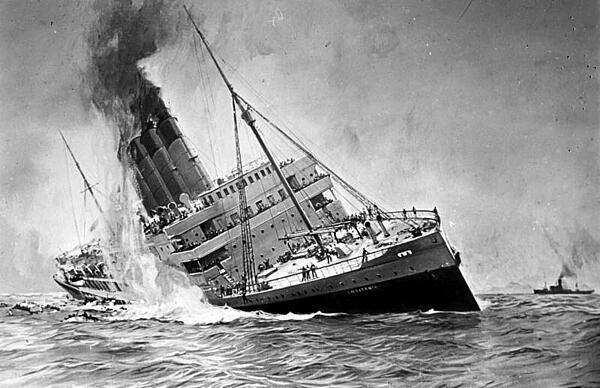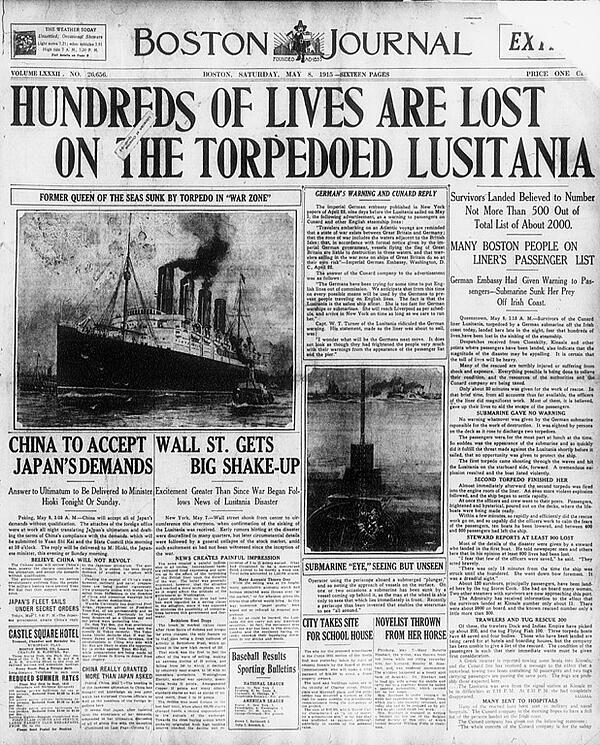The Lusitania
The passenger liner The Lusitania was torpedoed and sunk by a German U-Boat on 7 May 1915, killing 1,200 passengers. The sinking of The Lusitania is often seen as a major reason for America’s involvement in World War One, although its true impact is debatable.
As the Lusitania was sailing from New York to Liverpool, she carried many American civilians. America was neutral at the time of the voyage in mid-1915. The dangers of the voyage were made clear to passengers. Some newspapers printed an advert financed for by the German Embassy, warning that any ship sailing into the “European War Zone” was a potential target for German submarines.
Despite this, the Lusitania was filled with passengers. Some received an anonymous telegram warning them not to travel, but most passengers were still unconcerned. The ship was billed by Cunard as the "fastest and largest steamer now in the Atlantic service" and it was widely believed that the Lusitania had the power could outrun any other ships or submarines.

Moreover, many passengers struggled to believe that a liner without any military value would be a legitimate German target. They also found comfort in the fact that there were many rich and famous passengers on board. It was thought that the likes of multi-millionaire Alfred Vanderbilt and wine merchant George “Champagne King” Kessler wouldn’t have been travelling if was really unsafe.
Faced with the luxury of the 32,000 liner, the passengers soon forgot about the perils of the journey. One female survivor commented:
“I don’t think we thought of war. It was too beautiful a passage to think of anything like war.”
On the night of the 4 May, Lusitania reached her half-way point. At the same time the U-boat U20 appeared off the Irish coast off the Old Head of Kinsdale. U20 was captained by Kapitän-leutnant Schwieger.
In all, there were about 15 German U boats in the "European War Zone" - the zone that the Lusitania was about to move into. In February 1915 the Germans had established a U-boat blockade around Britain, making any vessel a legitimate target.
U20 had proved itself a powerful weapon. On 6 May it had already attacked and sunk two medium-sized liners, the ‘Candidate’ and the ‘Centurion’.
At 19.50 on 6 May, the Lusitania received a warning from the Admiralty about U-boat activity off the south coast of Ireland. The crew responded with safety drills.
The next morning, 7 May, the Lusitania was close to the Irish coast. The ship's captain, Captain Turner, expressed concern at the lack of ships ahead of him, including protective naval ships.
At 13.40 on 7 May, Turner came into sight of the Old Head of Kinsdale. At a similar time, Schwieger spotted the Lusitania and fired the first torpedo. At 14.10, Schwieger noted in his log: “Shot hits starboard right behind bridge. An unusually heavy detonation follows with a strong explosion cloud…”
The Lusitania sank in just 18 minutes. The crew struggled to launch the lifeboats due to the speed and the angle of the ship.
1,153 passengers and crew drowned; 128 of the 197 Americans on board died. The tragedy sparked outrage in America and Great Britain.
However, the sinking was - and still is - surrounded by unanswered questions:
Why did the liner sink so quickly? Schwieger commented on the unusually large explosion in his log, despite the fact that only one torpedo was fired.
Why are there reports of a second explosion when only one torpedo was fired?
Germany maintained that this was due to military cargo on board, but others argue that it was from loose coal dust igniting. The Lusitania’s hold carried 4,200 cases of small arms ammunition, but this was a small amount in comparison to the millions of bullets being used in the Western Front. But it still counted as contraband, officially making it a target.
The sinking led to outrage in Britain and the United States. The British propaganda machine went into overdrive condemning the sinking as an act of piracy. The Times referred to the sinking by condemning those who doubted German brutality:
"The hideous policy of indiscriminate brutality which has placed the German race outside of the pale. The only way to restore peace in the world, and to shatter the brutal menace, is to carry the war throughout the length and breadth of Germany. Unless Berlin is entered, all the blood which has been shed will have flowed in vain"
To satisfy the Americans, the Germans promised President Wilson that an event like the ‘Lusitania’ would not happen again and the 'sink on sight' policy was called off on 18 September 1915 - although it was re-introduced on 1 February 1917.
The sinking sent US-German relations into crisis. Britain hoped that America would declare war on Germany but President Wilson stood firm. Although he condemned the attack and fought for the “indisputable right” of Americans to free passage, he was determined not to enter the war.
See also: Theobald von Bethmann Hollweg

MLA Citation/Reference
"The Lusitania". HistoryLearning.com. 2026. Web.
